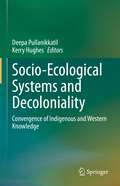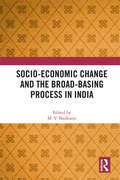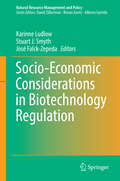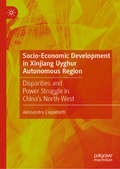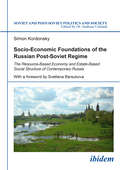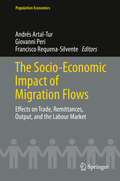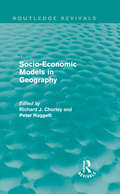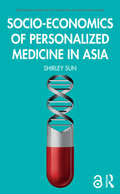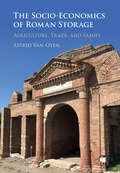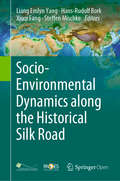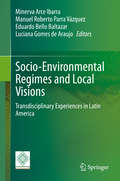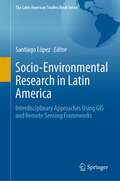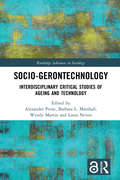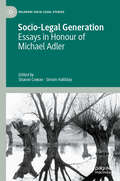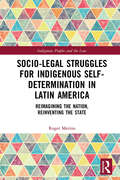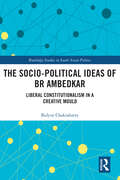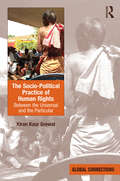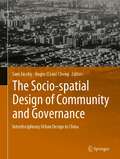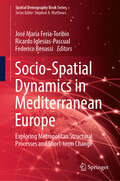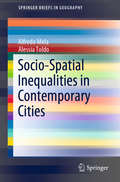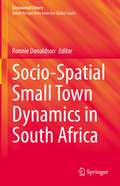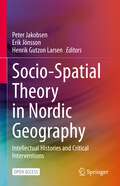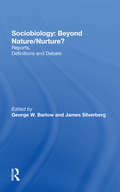- Table View
- List View
Socio-Ecological Systems and Decoloniality: Convergence of Indigenous and Western Knowledge
by Deepa Pullanikkatil Kerry HughesThis contributed volume provides case studies from around the world that feature a convergence of indigenous and western knowledge in an attempt to understand complex socio-ecological systems. The book provides an understanding of socio-ecological systems in an ethical space using a 'Decoloniality' approach (i.e. untangling the production of knowledge from a primarily Eurocentric episteme). The work presented here integrates and merges indigenous knowledge with western science, thereby building on the strengths of each in service of understanding these systems. The editors of this volume approach indigenous communities and scientists as equal knowledge-holders and, in doing so, contributes towards improved understanding of socio-ecological systems and interactions in cross-cultural contexts. This volume will be of interest to scientists, instructors, students and policy makers across disciplines such as environmental sciences, social sciences, interdisciplinary studies, cultural studies, ethnobotany, anthropology and plant genetic resources.
Socio-Economic Change and the Broad-Basing Process in India
by M. V. NadkarniThis book offers a new concept of inclusion of the marginalised in India — the Broad-basing Process. The author examines how through this process increasing numbers of marginalised social groups can enter into the social, political and economic mainstream and progressively derive the same advantages from society as the groups already part of it. The book critically reviews how the broad-basing process has worked in the past in India both before and after its independence. It examines how social groups like Dalits, OBCs, Muslims, women and the labour class have fared, and how far economic development, urbanisation, infrastructure development and the digital revolution have helped the marginalised and promoted broad-basing. It also offers mechanisms to speed up broad-basing in poorer economies. A first of its kind, this volume will be useful for scholars and researchers of political studies, sociology, exclusion studies, political economy and also for general readers.
Socio-Economic Considerations in Biotechnology Regulation
by Karinne Ludlow Stuart J. Smyth José Falck-ZepedaWithin the context of the Convention on Biological Diversity (CBD), the Cartagena Protocol on Biosafety (CPB) was established as an implementing agreement. The CPB is an international agreement establishing the rights of recipient countries to be notified of and to approve or reject the domestic import and/or production of living modified organisms (LMOs). Decisions regarding import/production are to be on the basis of a biosafety assessment. Article 26. 1 of the CPB allows for the (optional) inclusion of socio-economic considerations (SECs) into that biosafety assessment process. This book compiles expert assessments of the issues relevant to SEC assessment of LMOs and fundamental for decisions regarding whether to undertake such assessments at all. It includes an overview of the inclusion of SEC assessment in the regulation of LMOs that looks at the rationale for the inclusion of SECs, in the context of the existing science-based risk assessment systems. This book reviews the various factors that can and have been suggested for inclusion in SEC assessment, and provides a meaningful dialogue about the contrasts, benefits and tradeoffs that are, and will, be created by the potential move to the inclusion of SECs in the regulation of LMOs, making it of interest to both academics and policy-makers.
Socio-Economic Development in Xinjiang Uyghur Autonomous Region: Disparities and Power Struggle in China’s North-West
by Alessandra CappellettiIn an unprecedented exploration of space and power in rural Xinjiang, a Chinese region home to the Muslim population of the Uyghurs, this book adopts a grounded theory approach and a trans-ethnic perspective into the complex and sensitive topic of land issues and agricultural land evictions in Xinjiang Uyghur Autonomous Region. By exposing the dynamics of land acquisition and power building in the politically contested space of the region, the author shows how state owned land in a key commercial and cultural hub on the new Silk Road became a commodity, in a context of violent human interactions driven by power. Relying on previously undisclosed material and on a unique field research among farmers and local authorities, the author retraces the steps of Uyghur peasant workers, entangled in a suspended situation between abandoned rural villages, migration and urban alienation, in a book which explores agency in violent processes of social change, and adds concepts and insights to the current knowledge of how we become modern citizens. The microcosm of Kashgar, an oasis-city in Xinjiang, acts as a mirror reflecting socio political dynamics framing people’s identity. Shedding light on one of the most inaccessible region in China, this book is a key read for academics and a broader public willing to get a clearer view of one of the sourest power struggle in the most contested region within the next superpower.
Socio-Economic Foundations of the Russian Post-Soviet Regime: The Resource-Based Economy and Estate-Based Social Structure of Contemporary Russia
by Simon KordonskySimon Kordonsky divides the social structure of contemporary Russia into distinct estates or social groups and describes each organization's unique resource-based political and economic nature. As he guides readers through Russia's peculiar service and support estate system, Kordonsky reveals how remarkably effective inventing and institutionalizing threats can be in the distribution of scarce resources in a social system of this kind. His book emphasizes the fundamental differences between resource-based economies and traditional risk-based economies and their role in Russia's future.
Socio-Economic Foundations of the Russian Post-Soviet Regime: The Resource-Based Economy and Estate-Based Social Structure of Contemporary Russia (Soviet and Post-Soviet Politics and Society #152)
by Simon KordonskySimon Kordonsky divides the social structure of contemporary Russia into distinct estates or social groups and describes each organization's unique resource-based political and economic nature. As he guides readers through Russia's peculiar service and support estate system, Kordonsky reveals how remarkably effective inventing and institutionalizing threats can be in the distribution of scarce resources in a social system of this kind. His book emphasizes the fundamental differences between resource-based economies and traditional risk-based economies and their role in Russia's future.
The Socio-Economic Impact of Migration Flows
by Andrés Artal-Tur Giovanni Peri Francisco Requena-SilventeThough globalisation of the world economy is currently a powerful force, people's international mobility appears to still be very limited. The goal of this book is to improve our knowledge of the true effects of migration flows. It includes contributions by prominent academic researchers analysing the socio-economic impact of migration in a variety of contexts: interconnection of people and trade flows, causes and consequences of capital remittances, understanding the macroeconomic impact of migration and the labour market effects of people's flows. The latest analytical methodologies are employed in all chapters, while interesting policy guidelines emerge from the investigations. The style of the volume makes it accessible for both non-experts and advanced readers interested in this hot topic of today's world.
Socio-Economic Models in Geography (Routledge Revivals)
by Richard J. Chorley and Peter HaggettFirst published in 1968, this book explores the theme of geographical generalization, or model building. It is composed of seven of the chapters from the original Models in Geography, published in 1967. The first chapter broadly outlines this theme and examines the nature and function of generalized statements, ranging from conceptual models to scale models, in a geographical context. The following six chapters deal with socio-economic building in geography. They focus on demographic and sociological models as well as looking at special aspects of models in human geography in reference to economic development, urban geography and settlement location, industrial location, and agricultural activity. This book represents a robustly anti-idiographic statement of modern work in one of the major branches of geography.
Socio-economics of Personalized Medicine in Asia
by Shirley SunThe second decade of the twenty-first century has witnessed a surging interest in personalized medicine with the concomitant promise to enable more precise diagnosis and treatment of disease and illness, based upon an individual’s unique genetic makeup. In this book, my goal is to contribute to a growing body of literature on personalized medicine by tracing and analyzing how this field has blossomed in Asia. In so doing, I aim to illustrate how various social and economic forces shape the co-production of science and social order in global contexts. This book shows that there are inextricable transnational linkages between developing and developed countries and also provides a theoretically guided and empirically grounded understanding of the formation and usage of particular racial and ethnic human taxonomies in local, national and transnational settings.
The Socio-Economics of Roman Storage: Agriculture, Trade, and Family
by Astrid Van OyenIn a pre-industrial world, storage could make or break farmers and empires alike. How did it shape the Roman empire? The Socio-Economics of Roman Storage cuts across the scales of farmer and state to trace the practical and moral reverberations of storage from villas in Italy to silos in Gaul, and from houses in Pompeii to warehouses in Ostia. Following on from the material turn, an abstract notion of 'surplus' makes way for an emphasis on storage's material transformations (e.g. wine fermenting; grain degrading; assemblages forming), which actively shuffle social relations and economic possibilities, and are a sensitive indicator of changing mentalities. This archaeological study tackles key topics, including the moral resonance of agricultural storage; storage as both a shared and a contested concern during and after conquest; the geography of knowledge in domestic settings; the supply of the metropolis of Rome; and the question of how empires scale up. It will be of interest to scholars and students of Roman archaeology and history, as well as anthropologists who study the links between the scales of farmer and state.
Socio-Environmental Dynamics along the Historical Silk Road
by Liang Emlyn Yang Hans-Rudolf Bork Xiuqi Fang Steffen MischkeThis open access book discusses socio-environmental interactions in the middle to late Holocene, covering specific areas along the ancient Silk Road regions. Over twenty chapters provide insight into this topic from various disciplinary angles and perspectives, ranging from archaeology, paleoclimatology, antiquity, historical geography, agriculture, carving art and literacy. The Silk Road is a modern concept for an ancient network of trade routes that for centuries facilitated and intensified processes of cultural interaction and goods exchange between West China, Central Asia, the Middle East, and the Mediterranean. Coherent patterns and synchronous events in history suggest possible links between social upheaval, resource utilization and climate or environment forces along the Silk Road and in a broader area. Post-graduates in studying will benefit from this work, as well as it will stimulate young researchers to further explore the role played by the environment in long-term socio-cultural changes.
Socio-Environmental Regimes and Local Visions: Transdisciplinary Experiences in Latin America
by Minerva Arce Ibarra Manuel Roberto Parra Vázquez Eduardo Bello Baltazar Luciana Gomes de AraujoThis book presents oral histories, collective dialogues, and analyses of rural and indigenous livelihoods facing global socio-environmental regime change in Latin America (LA). Since the late twentieth century, rural and indigenous producers in LA, including agriculturists, coffee-growers, as well as small-scale farmers/fishers, and others, have had to resist, cope with, or adapt to a range of neoliberal socio-environmental regimes that impact their territories and associated resources, including water, production systems and ultimately their cultural traditions. In response, rural producers are using local visions and innovation niches to decide what, when, and how to resist, cope with uncertainty, and still be successful in using their customary laws to retain their land rights and livelihoods.This book presents a range of ethnically diverse case studies from LA, which addresses socio-environmental, educational, and law regimes’ effects using transdisciplinary research approaches in rural, traditional and indigenous production systems. Based on both, the results and insights gained into how producers are resisting and adapting to these regimes, as well as decades of research carried out in LA rural territories by the participating authors, the book puts forward a baseline for devising new public policies that are better suited to the real challenges of livelihoods, poverty, and environmental degradation in LA. These recommendations are rooted in post-development thinking; they promote territorial public policy with social inclusion and a human’s rights approach. The book draws on over 20 years of research carried out by LA’s academics and their undergraduate and graduate students who have addressed collaborative work, participatory research, and transdisciplinary approaches with rural commons and communities in LA. It features 19 case studies, with contributions from Argentina, Bolivia, Brazil, Colombia, Cuba, Honduras, and Mexico.
Socio-Environmental Research in Latin America: Interdisciplinary Approaches Using GIS and Remote Sensing Frameworks (The Latin American Studies Book Series)
by Santiago LópezThis contributed volume presents relevant examples of socio-environmental research that highlight the challenges and opportunities of using geotechnologies in interdisciplinary settings across the vast, culturally, and environmentally mega-diverse region known as Latin America. While remote sensing has been mostly used for mapping and monitoring physical features, geographic information systems open up opportunities for the integration of socio-economic and environmental data collected through individual and community-based surveys, in-situ measurements, and other participatory research techniques to offer additional analytically grounded power when evaluating socio-environmental processes that shape Latin American landscapes. The topics addressed in this book include deforestation and land degradation, borderlands dynamics, agriculture and agroecological systems, environmental conservation and development, public health, tourism, environmental justice, archeology, volunteered geography and urban planning, among others. The book is intended for academics, graduate and undergraduate classrooms, and general audiences with interest in Latin America and the socio-environmental issues that threaten the sustainability of the region and local communities. The book will also appeal to practitioners, managers, and policy makers interested in the application of geo-technologies and field-based research to address complex socio-environmental problems in the Global South.
Socio-gerontechnology: Interdisciplinary Critical Studies of Ageing and Technology (Routledge Advances in Sociology)
by Alexander PeineSocial change in the twenty-first century is shaped by both demographic changes associated with ageing societies and significant technological change and development. Outlining the basic principles of a new academic field, Socio-gerontechnology, this book explores common conceptual, theoretical and methodological ideas that become visible in the critical scholarship on ageing and technology at the intersection of Age Studies and Science and Technology Studies (STS).Comprised of 15 original chapters, three commentaries and an afterword, the book explores how ageing and technology are already interconnected and constantly being intertwined in Western societies. Topics addressed cover a broad variety of socio-material domains, including care robots, the use of social media, ageing-in-place technologies, the performativity of user involvement and public consultations, dementia care and many others. Together, they provide a unique understanding of ageing and technology from a social sciences and humanities perspective and contribute to the development of new ontologies, methodologies and theories that might serve as both critique of and inspiration for policy and design.International in scope, including contributions from the United Kingdom, Canada, the United States, Australia, Germany, Norway, Denmark, Austria, the Netherlands, Spain and Sweden, Socio-gerontechnology is an agenda-setting text that will provide an introduction for students and early career researchers as well as for more established scholars who are interested in ageing and technology. Chapters 3, 5, and 15 of this book are freely available as downloadable Open Access PDFs at http://www.taylorfrancis.com under a Creative Commons Attribution-Non Commercial-No Derivatives (CC-BY-NC-ND) 4.0 license.
Socio-Legal Generation: Essays in Honour of Michael Adler (Palgrave Socio-Legal Studies)
by Sharon Cowan Simon HallidayThis book honors the diverse and path-breaking work of Michael Adler, a pioneer of socio-legal scholarship in the UK. The book brings together an international group of scholars—established and emerging researchers from across the globe—to develop key ideas generated by Adler’s scholarship. Building on his rich portfolio of creative work at the interface of law and social science, the book explores themes that continue to resonate in contemporary debates about how best to understand the relationship between justice, fairness, and the modern administrative state. Specifically, the book re-examines core issues which Adler, as a key figure of the first generation of UK socio-legal scholars, explored, including: the relationship between official discretion and the rule of law; the justice of internal administrative processes; the importance of a ‘bottom up’ perspective on justice; power and accountability in the prison sector; access to justice for social welfare claimants; and the promise of viewing law through the lens of social science.
Socio-Legal Struggles for Indigenous Self-Determination in Latin America: Reimagining the Nation, Reinventing the State (Indigenous Peoples and the Law)
by Roger MerinoThis book is an interdisciplinary study of struggles for indigenous self-determination and the recognition of indigenous’ territorial rights in Latin America. Studies of indigenous peoples’ opposition to extractive industries have tended to focus on its economic, political or social aspects, as if these were discrete dimensions of the conflict. In contrast, this book offers a comprehensive and interdisciplinary understanding of the tensions between indigenous peoples’ territorial rights and the governance of extractive industries and related state developmental policies. Analysing the contentious process pushed by indigenous peoples for implementing pluri-nationality against extractive projects and pro-extractive policies, the book compares the struggle for territorial rights in Bolivia, Ecuador and Peru. Centrally, it argues that indigenous territorial defenses against the extractive industries articulate a politics of self-determination that challenges coloniality as the foundation of the nation-state. The resource governance of the nation-state assumes that indigenous peoples must be integrated or assimilated within multicultural arrangements as ethnic minorities with proprietary entitlements, so they can participate in the benefits of development. As the struggle for indigenous self-determination in Latin America maintains that indigenous peoples must not be considered as ethnic communities with property rights, but as nations with territorial rights, this book argues that it offers a radical re-imagination of politics, development, and constitutional arrangements. Drawing on detailed case studies, this book’s multidisciplinary account of indigenous movements in Latin America will appeal to those with relevant interests in politics, law, sociology and development studies.
The Socio-political Ideas of BR Ambedkar: Liberal constitutionalism in a creative mould (Routledge Studies in South Asian Politics)
by Bidyut ChakrabartyDr. Bhimrao Ramji Ambedkar (1891–1956), popularly known as Babasaheb stands out for his relentless battle against caste discrimination. He was a voice for the marginalized of India’s demography that remained peripheral due to well-entrenched socio-economic and political prejudices. This book is an analytical account of how Ambedkar’s socio-political ideas evolved as part of his wider politico-ideological challenge against self-motivated designs for exploitation of human beings by human beings. The author contends that it was an ideological discourse that he built in a context when dominant nationalist viewpoints seem to have hardly left space for any other discourse to grow. The book argues that Ambedkar’s socio-political ideas were an outcome of his personal experiences of social atrocities which were justified as integral to the caste system. The book comprises six substantial chapters which delve into the socio-political ideas of BR Ambedkar, concentrating on those sets of ideas through which he established his claim as an original thinker in opposition to the dominant nationalist discourse. Unlike the most conventional studies of Ambedkar’s thoughts and ideas, the book provides a new methodological tool to decipher their conceptual roots. It is therefore argued that Babasaheb’s unique conceptualization of social justice was not just an outcome of his existential existence of being a Dalit, but an offshoot of his own understanding of liberalism as a mode of emancipating human beings from shackles of authority, power and domination. Examining Ambedkar’s ideas, the book charts and examines the growth and consolidation of constitutional democracy in India since it was inaugurated with the acceptance of the 1950 Constitution. It will be of interest to scholars in the fields of Indian political theory, South Asian politics and history.
The Socio-Political Practice of Human Rights: Between the Universal and the Particular (Global Connections)
by Kiran Kaur GrewalThis book examines discourses of rights and practices of resistance in post-conflict societies, exploring the interaction between the international human rights framework and different actors seeking political and social change. Presenting detailed new case studies from Sierra Leone, Sri Lanka and Kosovo, it reveals the necessity of social scientific interventions in the field of human rights. The author shows how a shift away from the realm of normative political or legal theory towards a more sociological analysis promises a better understanding of both the limits of current human rights approaches and possible sites of potential. Considering the diverse ways in which human rights are enacted and mobilised, The Socio-Political Practice of Human Rights engages with major sites of tension and debate, examining the question of whether human rights are universal or culturally relative; their relationship to forms of economic and political domination; the role of law as a mechanism for social change and the ways in which the language of human rights facilitates or closes sites of radical resistance. By situating these debates in specific contexts, this book concludes by proposing new ways of theorizing human rights. Empirically grounded and offering an alternate framework for understanding the fluid and ambiguous operation of power within the theory and practice of human rights, this volume will appeal to scholars of sociology, law and politics with interests in gender, resistance, international law, human rights and socio-legal discourse.
The Socio-spatial Design of Community and Governance: Interdisciplinary Urban Design in China
by Sam Jacoby Jingru Cyan ChengThis book proposes a new interdisciplinary understanding of urban design in China based on a study of the transformative effects of socio-spatial design and planning on communities and their governance. This is framed by an examination of the social projects, spaces, and realities that have shaped three contexts critical to the understanding of urban design problems in China: the histories of “collective forms” and “collective spaces”, such as that of the urban danwei (work-unit), which inform current community building and planning; socio-spatial changes in urban and rural development; and disparate practices of “spatialised governmentality”. These contexts and an attendant transformation from planning to design and from government to governance, define the current urban design challenges found in the dominant urban xiaoqu (small district) and shequ (community) development model. Examining the histories, transformations, and practices that have shaped socio-spatial epistemologies and experiences in China – including a specific sense of community and place that is rather based on a concrete “collective” than abstract “public” space and underpinned by socialised governance – this book brings together a diverse range of observations, thoughts, analyses, and projects by urban researchers and practitioners. Thereby discussing emerging interdisciplinary urban design practices in China, this book offers a valuable resource for all academics, practitioners, and stakeholders with an interest in socio-spatial design and development.
Socio-Spatial Dynamics in Mediterranean Europe: Exploring Metropolitan Structural Processes and Short-term Change (Spatial Demography Book Series #3)
by José María Feria-Toribio Ricardo Iglesias-Pascual Federico BenassiThis book analyses the most recent socio-territorial trends that are developing in the Spanish metropolitan space. The first part focuses on the most recent metropolitan dynamics and demographic changes in Southern Europe. The second part discusses the most important processes in metropolitan areas: the problems of increasing social and residential vulnerability and the problems of diversity management. The third part analyses some concrete cases of the main changes and complexity in the spatial dynamics of metropolitan areas in Southern Europe. Finally, the fourth and last part provides an overview on the instruments and the resources put in place by some Southern European cities for the development of governance and citizen participation as an instrument of reaction to the social, economic and COVID crisis. By discussing the main changes and uncertainties derived from the social scenarios after the pandemic, the dynamics of social dualisation of the city, as well as the necessaryinstruments for its analysis and the main challenges in urban governance with special attention of Southern European context, this book provides an interesting read for spatial demographers, human geographers, social scientists and spatial planners.
Socio-Spatial Inequalities in Contemporary Cities (SpringerBriefs in Geography)
by Alfredo Mela Alessia ToldoThe book explores social inclusion/exclusion from a socio-spatial perspective, highlighting the active role that space assumes in shaping social phenomena. Unlike similar books, it does not discuss exclusion and inclusion in particular geographical contexts, but instead explains these phenomena starting from the dense and complex set of relationships that links society and space. It particularly focuses on social differences and how the processes of exclusion and inclusion can produce a highly spatialized understanding of them, for example when particular groups of people are perceived as being out of place.At the same time, within the context of the different approaches that policies adopt to contrast the phenomena of social exclusion, it examines the role of participation as an instrument to promote bottom-up inclusion and cohesion processes.
Socio-Spatial Small Town Dynamics in South Africa (GeoJournal Library)
by Ronnie DonaldsonThis book explores small town geographical aspects by approaching them from a socio-spatial perspective. The contributions included in this book delve into a range of topics that have not been commonly studied before, such as white privilege, neglect of municipal infrastructure, collaborative governance, livelihoods in small-scale fisheries, housing provision, well-being in mining towns, studentification in rural contexts, election trends, and the historical development of small-town spas. The book adopts a socio-spatial point of view, providing a holistic understanding of the interplay between social and spatial factors within selected small town case studies. This approach sheds light on the socio-economic, political, and cultural dynamics that shape small towns. This localized perspective allows for a more targeted analysis of issues and potential solutions, taking into account the specific historical, cultural, and political contexts of small town South Africa. The edited volume serves as a valuable resource for academics, policymakers, practitioners, and anyone interested in understanding and improving small towns in South Africa.
Socio-Spatial Theory in Nordic Geography: Intellectual Histories and Critical Interventions
by Henrik Gutzon Larsen Peter Jakobsen Erik JönssonThis open access book is about socio-spatial theory in, and the nature of, Nordic geography. From both historical and contemporary perspectives, the book engages with theorisations of geography in the Nordic countries. Including chapters by geographers from Denmark, Finland, Iceland, Norway and Sweden, it reflects how theories about the relations between the social and the spatial have been developed, adopted and critiqued in Nordic human geography in relation to a wide range of themes, concepts and approaches. The book also traces institutional developments, distinct geographical traditions and intellectual histories, as well as authors’ own experiences as geographers in and beyond the Nordic area. The chapters together introduce and engage with debates and discussions that permeate Nordic geography and allows readers a glimpse of geographical thinking and the role of socio-spatial theory in the Nordic countries. By providing insights into how geographical ideas emerge, travel and are translated and adapted in specific contexts, the book contributes to debates about historical-geographical situatedness and theorisations of geography.
Sociobiology: Reports, Definitions And Debate
by George W Barlow James Silverberg Frank B LivingstoneTo most biologists, sociobiology represents the concept of strict Darwinian individual selection married to an analytical application of ecological principles and brought to bear on social behavior in an unusually exciting and productive way. Joining the biologists are a small number of social scientists. But there are radically divergent views as to how the field should be delimited, and sociobiology is one of the most widely discussed fields in biology and anthropology today. The symposium on which this book is based was arranged by a biologist and an anthropologist. The participants, leaders in their fields, ably present contrasting and responsible views on current issues. This is the first collection of essays on sociobiology in which opposing views are aired. It is an exciting, timely book and an important historical document.
Sociobiology
by Edward O. WilsonView a collection of videos on Professor Wilson entitled "On the Relation of Science and the Humanities"
